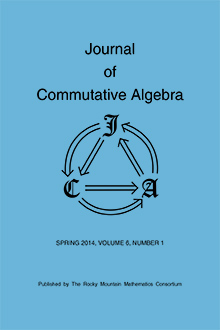Abstract
In this article we observe that $C(X)$ is integral over $I+\mathbb R$ if and only if $I$ is of the form of a finite intersection of real maximal ideals. The integral closure of a subring $I+\mathbb R$ is investigated and it turns out that $I+\mathbb R$ is integrally closed if and only if $I$ is semiprime and $\theta (I)$ is connected. We show that $I^u+\mathbb R$, where $I^u$ is the uniform closure of the ideal $I$, is always a ring of quotients of $I+\mathbb R$ and $C(X)$ is a ring of quotients of $I+\mathbb R$ if and only if $I$ is either essential (large) or a maximal ideal generated by an idempotent. Maximal subrings of the form $I+\mathbb R$ of $C(X)$ are characterized and it is shown that $[M^p]^u+\mathbb R$ (which is isomorphic to $C(X\cup \{p\})$, where $X\cup \{p\}$ is a subspace of $\beta X$) is not contained in a proper maximal subring of $C(X)$. We have observed that for each subring of the form $I+\mathbb R$ of $C(X)$, the sum of every two prime ideals of $I+\mathbb R$ is prime or all of $I+\mathbb R$ if and only if $X$ is an $F$-space. Ideals $I$ are characterized for which $I+\mathbb R$ is a regular ring and for every $z$-ideal $I$, we have shown that the sum of every two $z$-ideals of $I+\mathbb R$ is a $z$-ideal or all of $I+\mathbb R$. Finally, some algebraic and topological properties are given for which $I+\mathbb R$ is a self-injective ring or a uem-ring.
Citation
F. Azarpanah. M. Namdari. A.R. Olfati. "On subrings of the form $I+\mathbb {R}$ of $C(X)$." J. Commut. Algebra 11 (4) 479 - 509, 2019. https://doi.org/10.1216/JCA-2019-11-4-479
Information





